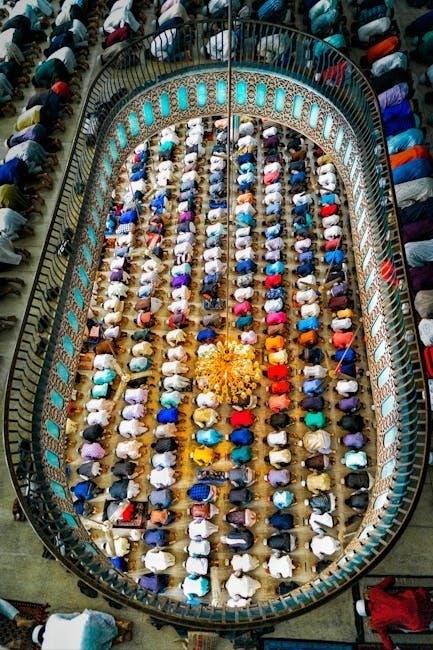Salah is a foundational pillar of Islam, the formal prayer performed five times daily․ It purifies the soul and strengthens the connection with Allah․
Significance of Salah in Islam
Salah is a direct link between a believer and Allah, fostering spiritual growth and self-refinement․ It is a purification of the soul, a shield against sin, and a source of inner peace․ Performing Salah five times daily instills discipline, gratitude, and mindfulness․ It strengthens faith, unites Muslims worldwide, and serves as a reminder of divine guidance․ Salah is not just a physical act but a spiritual and emotional connection, essential for a balanced Islamic lifestyle․

Prerequisites for Prayer
Prerequisites for Prayer include purity of body, clothes, and place, and facing the Qiblah․ These ensure a sacred and focused connection with Allah during Salah․
Step-by-Step Guide to Wudu (Ablution)
Start by saying Bismillah․ Wash hands up to wrists thrice․ Rinse mouth and nose․ Clean face, arms to elbows, and wipe head, ears, and neck once․ Wash feet up to ankles․ Perform all steps in order, ensuring no part remains dry․ Wudu cleanses the body and soul, preparing one for prayer․ It must be done with intention and care, following the Sunnah of Prophet Muhammad (peace be upon him)․
Conditions Invalidating Wudu
Wudu is invalidated by natural discharges like urine, stool, or gas․ Sleeping, vomiting, or losing consciousness also breaks it․ Eating camel meat or emitting impurities like blood invalidates Wudu․ It’s essential to redo Wudu in these cases to maintain purity for prayer․

Declaration of Intention (Niyyah)
Niyyah is declaring one’s intention to pray, done silently, specifying the prayer’s type and time․ It ensures sincerity and focus on worshiping Allah․
Formulating the Correct Intention
Formulating the correct intention (Niyyah) is essential before prayer․ It involves silently declaring the specific prayer’s type and time, ensuring sincerity and focus․ One must intend to worship Allah alone, seeking His pleasure․ This mental preparation helps avoid distractions and maintains the prayer’s purity․ The Prophet Muhammad (peace be upon him) emphasized that actions are judged by their intentions․ Thus, a sincere and clear Niyyah is vital for the prayer’s acceptance and spiritual connection with Allah․
Steps of the Prayer
Salah involves five daily prayers: Fajr, Zuhr, Asr, Maghrib, and Isha․ Each prayer includes Takbirat al-Ihram, recitation of the Quran, bowing (Ruku), prostration (Sujud), and Tashahhud․
Takbirat al-Ihram and Initial Recitation
Takbirat al-Ihram begins with reciting “Allahu Akbar” (God is the Greatest), marking the start of prayer․ Hands are raised to the ears, and the intention is declared․ The initial recitation follows, starting with the Fatiha (Surah Al-Fatihah) and a short surah or Quranic verses․ This phase sets the tone for worship, connecting the believer with Allah and fostering mindfulness․ Proper focus and recitation are essential to maintain the prayer’s sanctity and spiritual benefits․
Bowing (Ruku) and Prostration (Sujud)
After the initial recitation, the worshipper bends into Ruku, placing hands on knees, and glorifies Allah with “Subhana Rabbiyal Adhim” (Glory be to my Lord, the Great)․ Straightening up, they say “Sami Allahu liman hamidah” (Allah hears those who praise Him)․ Then, they transition to Sujud, prostrating with forehead, nose, hands, knees, and toes on the ground․ Supplications like “Subhana Rabbiyal A’la” (Glory be to my Lord, the Most High) are recited, emphasizing humility and submission to Allah․ These postures are integral to the prayer’s physical and spiritual essence․
Tashahhud and Ending the Prayer
Tashahhud is performed after completing the second prostration in the second unit of prayer․ The worshipper sits upright, reciting the Tashahhud prayer, which includes supplications like “At-tahiyyat” and “Allahumma salli․” After completing all units, the final Tashahhud is recited․ The prayer concludes with the Taslim, where the worshipper greets Allah by saying “As-salamu Alaikum wa Rahmatullah” while turning their head right and left․ This signifies the end of Salah, emphasizing gratitude and divine connection․
The Final Greeting (Taslim)
The Taslim marks the conclusion of Salah, where the worshipper turns their head right and left, saying, “As-salamu Alaikum wa Rahmatullah․” This greeting signifies peace and blessings from Allah․ It is performed after completing all units of prayer and the final Tashahhud․ The Taslim is a divine farewell, emphasizing the completion of the prayer and the worshipper’s return to worldly life․ It underscores the connection with Allah and the peaceful essence of Islamic worship, serving as a tranquil ending to the spiritual ritual․
Common Mistakes During Prayer
Common errors include rushing through prayers, incorrect postures, and forgetting essential recitations․ These mistakes can affect the prayer’s validity and spiritual connection, requiring attention to detail․
Understanding and Avoiding Errors
Common mistakes during prayer include rushing, incorrect postures, and forgetting essential recitations․ Distractions, such as not facing the Qiblah or wearing improper attire, can invalidate prayers; To avoid errors, Muslims are advised to focus on mindfulness, follow proper guidance, and seek knowledge from reliable sources․ Practicing consistently and seeking feedback from scholars can help refine one’s prayer․ Being attentive and intentional in each step ensures the prayer’s validity and spiritual significance․
Timings of the Five Daily Prayers
The five daily prayers—Fajr, Zuhr, Asr, Maghrib, and Isha—are scheduled at: Fajr before sunrise, Zuhr at noon, Asr in the afternoon, Maghrib after sunset, and Isha at night․
Understanding Fajr, Zuhr, Asr, Maghrib, and Isha
The five daily prayers are timed according to the sun’s position․ Fajr is before sunrise, a time for seeking blessings․ Zuhr occurs at midday, Asr in the late afternoon, Maghrib after sunset, and Isha at night․ These timings are calculated based on solar movements and vary by location․ Fajr is the first prayer, offering a fresh start, while Isha is the last, reflecting on the day․ Adhering to these timings is a fundamental aspect of worship in Islam․

Additional Supplications
After prayer, Muslims engage in Dua and Dhikr, seeking Allah’s mercy and blessings․ These supplications strengthen faith and foster a deeper connection with the Almighty․
Dua and Dhikr After Prayer
Dua and Dhikr are essential acts of worship after Salah, fostering a deeper connection with Allah․ Muslims recite specific supplications, seeking forgiveness, guidance, and blessings․ Common Dhikr phrases include Subhanallah, Alhamdulillah, and Allahu Akbar․ These acts strengthen faith, bring spiritual comfort, and are highly recommended in Islamic teachings․ They serve as a means to express gratitude and humility, ensuring a continuous relationship with the Almighty beyond the formal prayer․ Regular practice of Dua and Dhikr enhances mindfulness and devotion in daily life․
Missed Prayers
Missed prayers must be made up as soon as remembered, performed exactly as scheduled․ This ensures continuity in worship and maintains spiritual consistency․
Guidance on Making Up Missed Prayers
When a prayer is missed, it should be performed as soon as it is remembered․ The missed prayer must be completed in the same manner as the scheduled prayer, maintaining the correct order and number of units․ One must declare the intention (Niyyah) for the specific prayer being made up․ Ensure proper Wudu and face the Qiblah to maintain the prayer’s validity․ This act of worship strengthens faith and demonstrates commitment to fulfilling religious obligations, even when circumstances cause delays․
Importance of Consistency
Consistency in prayer fosters a strong spiritual habit, purifying the soul and strengthening faith in Allah’s guidance․ Regular prayer establishes a steadfast connection with the Creator․
Establishing a Regular Prayer Routine
Creating a consistent prayer routine is vital for spiritual growth․ Start by setting specific times for each of the five daily prayers, using a timetable or app for accuracy․ Prepare a clean, quiet space for prayer, ensuring Wudu and appropriate attire․ Begin with a clear intention (Niyyah) and follow the prescribed steps․ Consistency strengthens faith and discipline, even when traveling or facing challenges․ Missed prayers should be made up promptly to maintain continuity․ Seek guidance from scholars or resources to refine your practice and stay committed to this sacred duty․

Seeking Guidance
Utilize reliable resources like prayer guides, PDFs, and Islamic websites for accurate information․ Seek advice from scholars, mosques, or online communities to deepen your understanding and practice of Salah․
Resources for Learning Prayer
Beginners can access various resources to learn Salah, including PDF guides like “A Guide to Prayer in Islam” by M․ Abdul Karim Saqib․ Websites such as Islamicity․com provide prayer timetables and tutorials․ Animated guides and videos demonstrate step-by-step prayer techniques․ Apps like Muslim Pro offer interactive prayer lessons․ Books and online courses are also available, offering detailed explanations and practical examples․ Engaging with local mosque communities and scholars provides personalized guidance․ These resources ensure a comprehensive understanding of Salah for those starting their spiritual journey in Islam․
Salah is a vital Islamic pillar․ Consistent prayer strengthens faith and connects believers with Allah․ May this guide inspire dedication and spiritual growth in worship․
Salah is a profound connection to Allah, purifying the soul and strengthening faith․ Perform the Five Daily Prayers with sincerity, starting with intention and proper ablution; Each prayer is a fresh opportunity for spiritual growth․ Seek guidance from resources like the Quran and Hadith to ensure correctness․ Consistency is key; begin with small steps and gradually refine your practice․ Remember, every effort in worship is valued by Allah․ May your journey in Salah be transformative and deeply rewarding, bringing you closer to Him․

